Entry Level Attorney Resume Sample & 2024 Writing Tips
A recent law school graduate can find it challenging to retain that first attorney position. The path involves passing the BAR exam, completing an associate attorney internship, and finally – choosing a specialty to practice. Once you’ve traveled through the path – you’ll need to apply for a job. The first step is to create an entry level attorney resume that is eye-catching, easy-to-review, and helps you gain that all-important interview.
Writing a new attorney resume, cover letter and application can be challenging – even to the most articulate communicator. Several up-and-coming lawyers struggle, mainly because they overthink it – or are not certain how entry-level attorney positions are earned in the first place. One glaring statement of fact is that the resume is the first hurdle any candidate must eclipse during their job search.
So – where do you begin? This article will provide you with an accurate roadmap that will show you how to format and write a brilliant resume. We’ll give you a professionally written sample resume for entry level attorney. Further, we’ll dive into the best practices for formatting entry level attorney resume samples.
Let’s get started.
Entry Level Attorney Resume Sample
Lawyers, regardless of their specialty, understand the value of the organization. From conducting legal research, preparing a brief, to case strategy and negotiating settlements, the lawyer who is organized and places an emphasis on details will succeed over those who are not.
The sample entry level attorney resume is a shining example of what yours should look like. It is written with a professional, yet conversational tone is filled with action verbs and features the skills and abilities that exceptional attorneys possess.
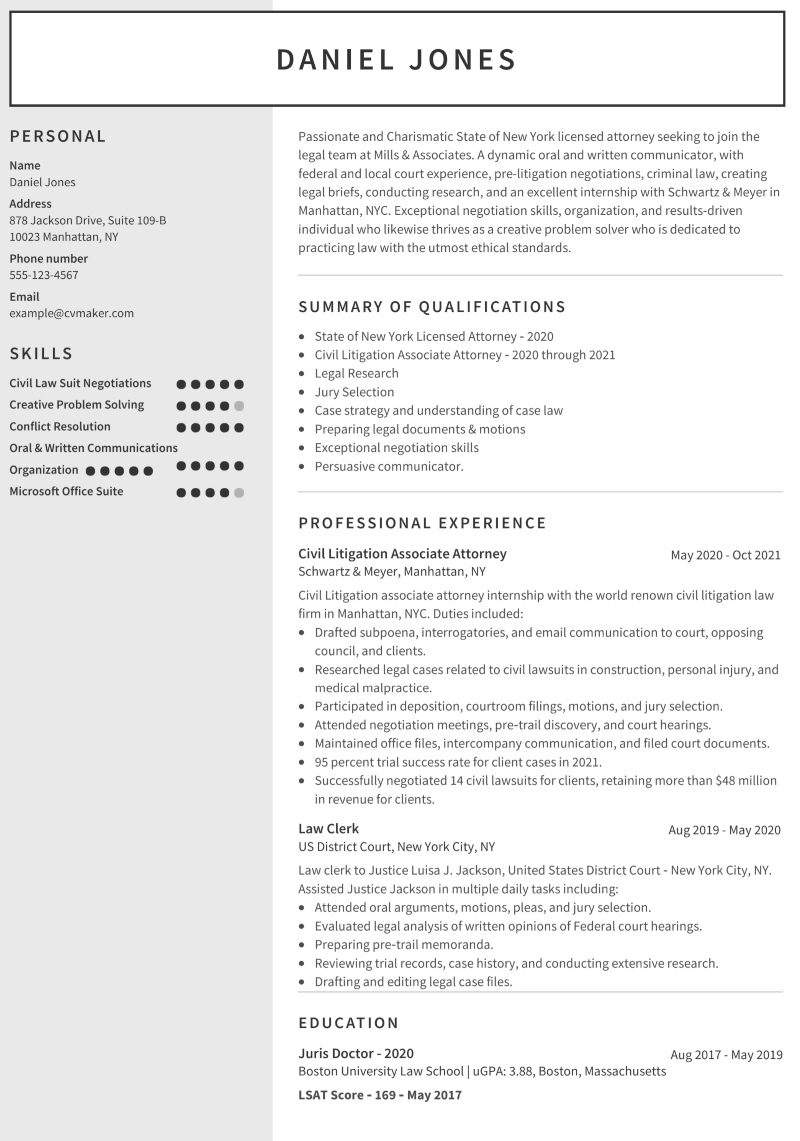
When you read this sample resume for an entry-level attorney, you’ll notice that it’s easy to read, opens with a powerful professional summary, and is supported with evidence from work history to education that proves why Daniel is the best candidate for this law firm’s lawyer position. He showcases his experience as one of the best law students in his school, previous associate attorney – learning vital skills including federal and local court experience, pre-litigation negotiations, criminal law, creating legal briefs, conducting research, and more.
Additionally, his resume includes an easy-to-scan summary of his qualifications, his education, and references. It is formatted clean, has a natural flow, and tells a story from start to finish.
Now that you’ve had a chance to review this sample entry-level attorney resume, let’s break down each of the sections in the information below.
2024 Guide to Writing Resumes for Entry Level Attorneys
Arguably the most difficult part of becoming an attorney is finding that initial entry level position. Regardless of the experience level, how well you did in law school, or who you might know, most successful lawyers are those who’ve mastered writing resumes for entry level attorney positions.
So how does one structure resumes for jobs for attorneys with no experience? Is there a best practice resume format for entry level attorney positions? Or does it make sense to have a professional help you with your new attorney resume? The answer to all three questions is ‘YES’. That’s what we’re going to tackle in the content below.
We’ve found that the most efficient way to begin any resume is through organization and structure. For a multitasking recent law school graduate, this begins by creating a structured outline – or what we call a master resume.
A master resume is a working document – that permits you the flexibility to document all details – in each section, edit the content, fine-tune the grammar, and organize it following the best practices.
Since you’ll be applying for your first entry-level lawyer position, a good resume should be clean, organized, and easy to read. It must build a case supporting your application and prove to the intended audience why you are the best person for the job.
With regards to the sections for applying to entry-level attorney positions, we recommend keeping it simple. Here is a list of the primary sections you should create in your master resume.
- Contact Information
- Professional Summary
- Summary of Qualifications
- Practical Work Experience
- Education
- Skills
- References
Section #1 – List Your Contact Information
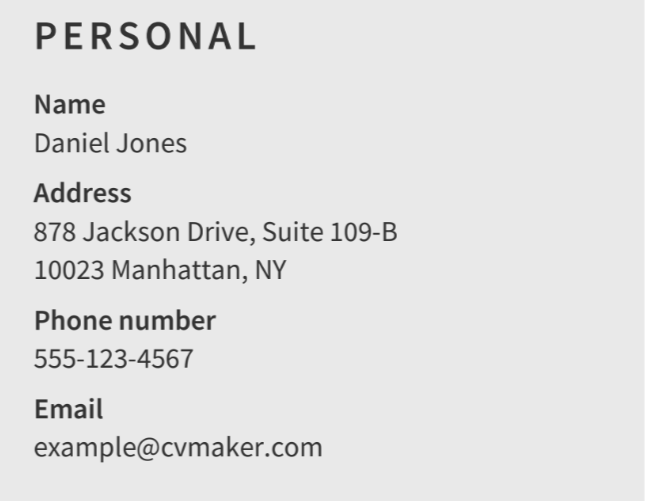
It’s hard for prospective employers to contact you if they don’t have accurate data. The contact information on your resume must be 100 percent accurate. While some resume writers suggest documenting multiple points of contact – including several phone numbers, we prescribe to the keep it simple concept.
How to Format this Section
The contact section should be written clean, organized, and easy to follow. List your full legal name, mailing address, email, and your mobile phone number. Make sure you have connected your email to your mobile device, and that you have full access to SMS text alerts. Some attorneys wonder if it’s acceptable to write ‘Esquire’ or ESQ. after their name on the resume. The short answer is yes, it’s acceptable. If you’ve earned the professional title, feel free to showcase it with pride.
Section #2 – Professional Summary

A professional summary is a four or five-sentence elevator pitch that permits the candidate to explain why they are an ideal candidate for an entry-level lawyer position. It’s often filled with action verbs or key hard and soft skills that help them become a successful attorney.
The paragraph should be written with a professional, yet conversational tone – that is easy to follow, grammatically perfect, and with a sense of urgency. Writing the professional summary after you’ve completed each section below is regarded by many experts as the best way to accomplish this task.
For a beginning attorney, some of the crucial skills that you should mention in this resume include:
- Your law school graduation (with GPA) and State certification to practice law
- Persuasive Communication
- Comprehension of Legal Statutes
- Motions and Pleas
- Advocacy of Clients in Multiple Industries
- Courtroom Etiquette
- Memoranda and Complex Legal Issues
One thing to consider is customizing your resume to the legal specialty that you’re licensed to practice. For example, if you’ve studied to become a litigation attorney, tax attorney, or criminal justice attorney, make sure to build the case that you have completed the correct educational and professional experience path to provide value to the firm.
How to Format this Section
As we’ve stated above, the professional summary is a 200-word paragraph. It should be written firm, yet with a charismatic tone. Always make sure to read the paragraph out loud, to ensure it sounds natural, and not stuffed with action verbs that simply don’t fit. This statement intends to provide the hiring manager with a powerful statement that is engaging – and convinces them to read more.
Section #3 – Summary of Qualifications
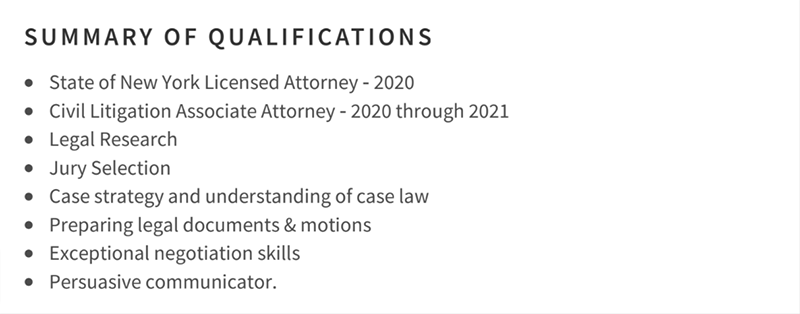
A beginning attorney is likely not going to have a tremendous amount of relevant work history – especially if they are applying for their first job. Nevertheless, it’s crucial to document your journey to becoming a lawyer. This would be the section where you introduce the relevant qualifications you’ve developed during your internship and law school.
A few of these qualifications that every entry level attorney should possess include the following:
- The date of BAR Exam Certification and State BAR association.
- Licensing data – States in which you are licensed to practice law.
- Case strategy and understanding of case law.
- Preparing legal documents.
- Exceptional negotiation skills.
- Persuasive communicator.
- Charismatic qualities.
As you can see in our sample entry level attorney resume posted above, our candidate Franklin has listed each of these qualifications – along with a few that support his legal specialty (in civil litigation). These job-specific qualifications will be supported by practical examples in your previous work history and experience section – following the summary of qualifications.
How to Format this Section
We recommend using an entry level lawyer resume template – which will help you format these qualifications. The section should be listed in bullet-point format, in an easy-to-follow structure. It’s suggested to write a brief introduction (no more than 3 sentences) that introduces your qualifications. Keep your qualifications to less than 8 entries.
Section #4 – Practical Work Experience
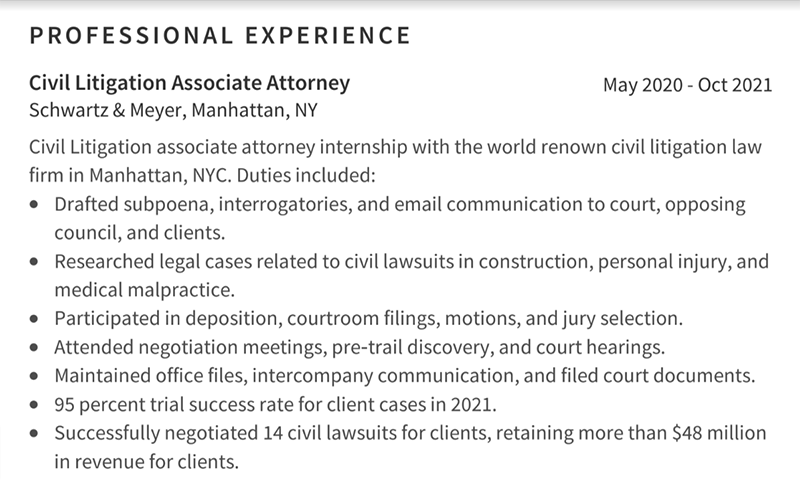
This is the section that most new lawyers struggle – simply because they don’t have a tremendous amount of legal work history. However, during their career path, they have likely served as interns, legal clerks, legal assistant, or paralegal professionals. This is what is considered practical or relevant experience.
In this legal experience section, you'll want to provide your job title, a brief job description, and some of the best accomplishments during your time.
How to Format this Section
With every resume, you should list the name of your employer, dates of employment, and some of the practical skills or accomplishments during your time. Best practices suggest listing each entry in reverse chronological order – or most recent/current to your oldest. For an entry level attorney position, make sure to list two relevant positions.
Section #5 – Education

To become an attorney, you’ll have to graduate from an accredited law school, pass the bar exam, and become licensed to practice law in the state in which you work. The education section should include two entries for an entry level attorney. Add the law school where you earned a Juris Doctor degree and your undergraduate education.
How to Format this Section
In this section, you’ll want to list the name of the school, the location, and the dates of attendance. There is no need to add bullet points discussing your area of focus or honors earned. Likewise, you don’t need to add your LSAT scores – but feel free to add them if you believe it will support your application.
Section #6 – References
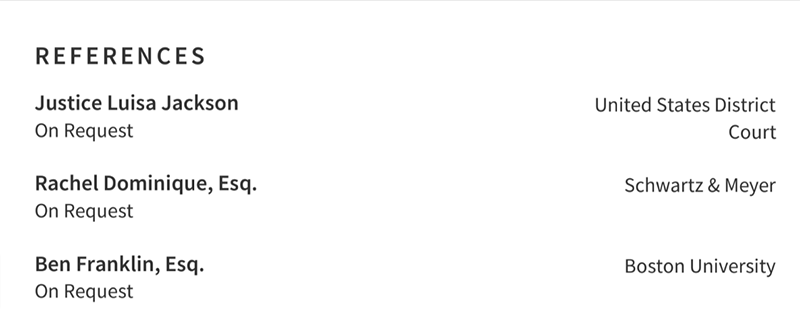
There are two types of references that you should add to your entry level attorney resume application. The first reference is a mentor, who practices law in the specialty you’ve chosen. The second type of reference is a personal one, who can vouch for your character, experience, and work ethic. Some people you may want to consider include previous college professors, high-profile members of the community, or an individual with a professional degree – such as other attorneys, doctors, or even politicians.
How to Format This Section
The privacy of your references is crucial to protect. As such, make sure to only list your reference first and last name, and place of employment. Do not document their contact information. The best thing to do here is simply writes “available upon request”.
Section #7 – Skills
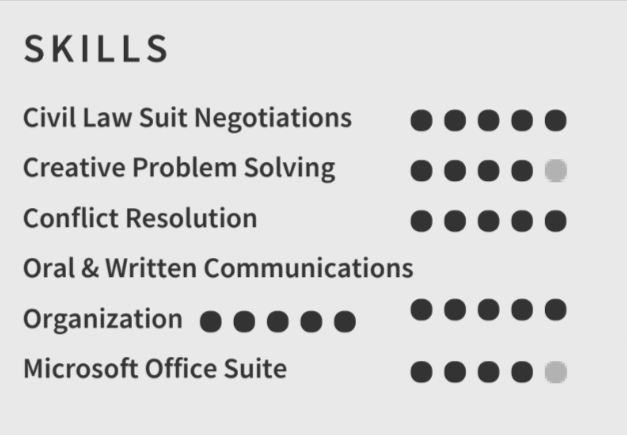
Any attorney possesses certain hard and soft skills which permit them to accelerate in this profession. Soft skill is an ability to use an attribute – such as being an exceptional written and oral communicator, being persuasive, or having exceptional charisma. A hard skill is the ability to use a tool – such as Microsoft Office Suite or Apple technologies, that permits you to accomplish your tasks with precision, efficiency, and a focus on quality.
How to Format this Section
A skills section should be bullet points – with a scale of your proficiency level listed in order. Generally, skills are rated as an expert, experienced, proficient, and good. Using a resume builder that has these rankings embedded in the tool can help you organize and structure the layout. We recommend listing your skills in the sidebar of your first page, so they are easy to review.
Other Legal Resume Templates
Sometimes, writing an entry level attorney resume is easier when you can review one created by a professional resume writer. We have assembled multiple legal resume templates, ranging from specialist positions to general legal practice. If you’d like to review a few of the most common lawyer resume examples, please click the links below.
Final Points on Writing Litigation Attorney and Litigation Associate Resumes
Lawyers are exceptional at research, focusing on minute details, and building a case to support their argument. Writing a resume for an entry level attorney follows a similar structure. Your goal is to craft an engaging resume, make a strong argument for your application, and convince the hiring manager that you are worthy of an interview.
Following the steps we’ve documented above will streamline this process – regardless of the specific industry you are applying for. Here is a brief recap of critical items to remember when you’re in the process of writing an engaging lawyer resume for a new hire.
- Structure your resume to ensure it has a nice flow from start to finish.
- Always write your resume on a plain white background with black font.
- Use an online platform called Grammarly.com to edit the content.
- Ensure its well-spaced, organized, and professional.
- Finally, read it out loud a few times before you’re ready to paste the content into an attorney resume template.
By following the tips and advice in the article above, you’ll have a better chance of engaging with potential employers. Take advantage of those action verbs we mentioned in the introduction – and pepper them throughout the resume – so that any automated software programs will pass the resume along to further review.